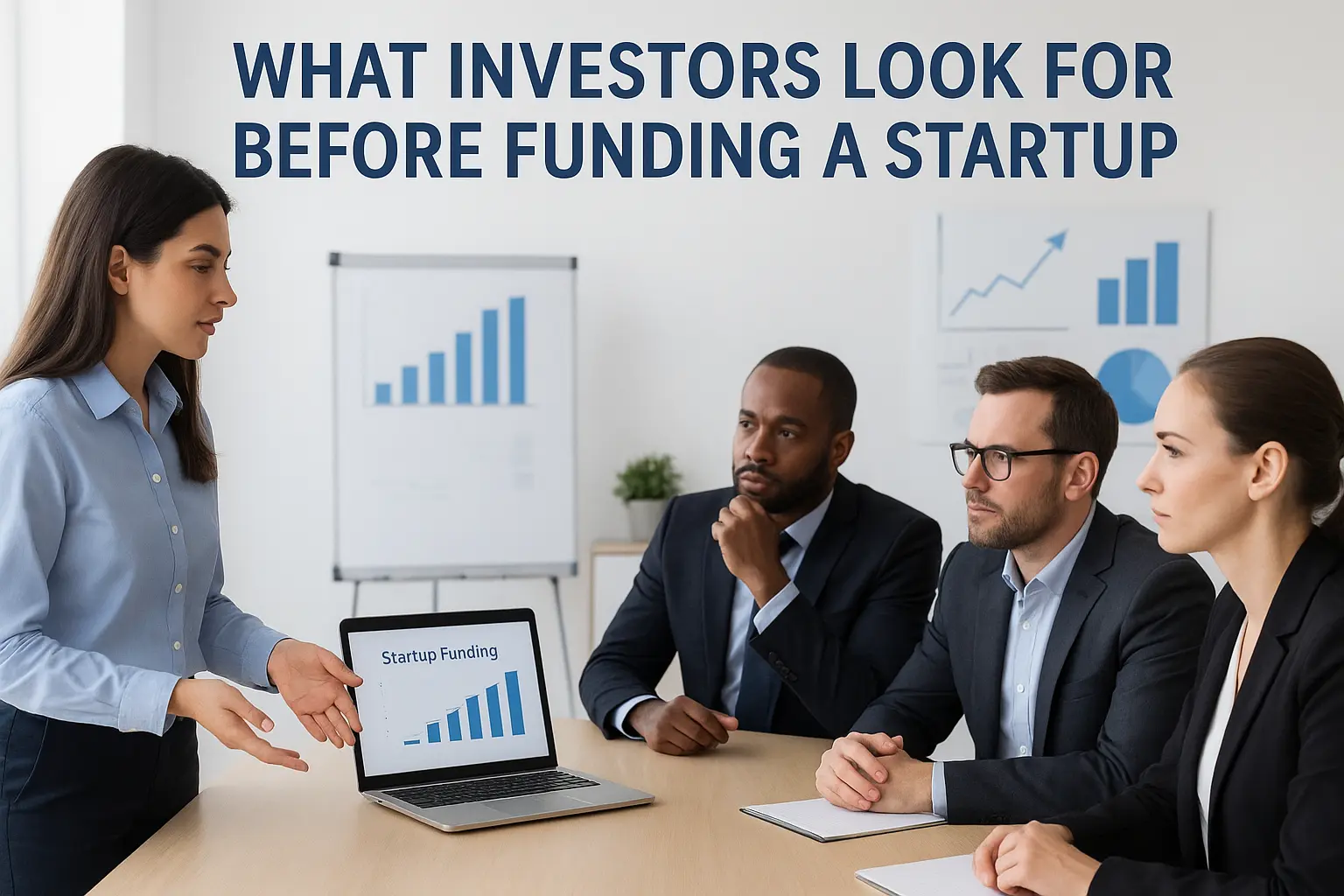Introduction – Why Investors Are the Lifeline of Startups
Every startup needs capital to grow. Without the right investors, even the best ideas struggle to scale. In 2025, investors have become more selective. They look beyond flashy presentations and focus on numbers, traction, and team strength.
You need investors who believe in your vision and your ability to execute it. But investors need proof before they commit. They assess risk, analyze your business model, and study how your startup can generate sustainable returns.
Data from Crunchbase shows that more than 70% of startups fail to raise funding because they fail to meet investor expectations. Most of them lack clarity in revenue plans or fail to show measurable progress.
If you understand what investors evaluate before funding a startup, you can present your business in a way that builds trust and confidence. This guide explains every factor investors consider and how you can prepare your startup to meet those expectations.
Why Understanding Investor Expectations Is Crucial
Investors are partners, not donors. They expect a return on every rupee they invest. When you know what drives their decisions, you make smarter choices in how you pitch, structure your business, and communicate your vision.
Here’s why understanding investor expectations matters:
- It helps you target the right investors for your stage and sector.
- You learn to present your financials with clarity.
- It builds long-term relationships based on transparency.
- You avoid rejections due to weak preparation.
For example, if you’re running a SaaS startup, investors expect you to track metrics like Monthly Recurring Revenue (MRR), Churn Rate, and Customer Lifetime Value (CLV). If you’re in e-commerce, they’ll focus on user retention, gross margins, and order frequency.
Knowing these expectations lets you shape your pitch and presentation around real investor priorities.
Understanding the Investor Mindset
Investors think differently from founders. They look at your business through the lens of risk, return, and scalability. Understanding their mindset helps you present your startup in a way that aligns with what they value most.
When investors evaluate startups, they usually ask three core questions:
- Is the problem big enough to solve?
- Is the business model scalable and profitable?
- Does the founding team have the ability to execute the plan?
Once you start viewing your startup from this perspective, your approach becomes more strategic and investor-focused.
What Drives Investors to Fund a Business
Investors want proof that your business can make money and grow fast. They don’t fund ideas. They fund progress.
Key motivators for investors include:
- Revenue potential: How fast your business can generate returns.
- Scalability: Whether your product can reach a wider market efficiently.
- Market validation: Evidence that customers are already using or interested in your product.
- Team competence: Investors invest in capable founders who can handle pressure and deliver.
If your startup shows early traction, it increases your chances of getting noticed. According to Startup Genome, startups with a validated product are 3.5 times more likely to attract investors than those still in the idea stage.
Difference Between Angel Investors, Venture Capitalists, and Seed Investors
Not all investors are the same. Each category has a different investment style, risk tolerance, and funding stage.
- Angel Investors: Usually invest their own money in early-stage startups. They look for high potential and innovative ideas.
- Venture Capitalists (VCs): Invest institutional funds. They prefer startups with proven revenue, strong teams, and market traction.
- Seed Investors: Provide small initial funding to help startups build prototypes or early versions of their products.
Knowing which type of investor fits your startup stage saves time and improves your chances of success.
How Investor Expectations Have Changed Over Time
The startup ecosystem in 2025 is more data-driven than ever. Investors expect real performance metrics, not assumptions. They look for:
- Early user traction
- Clear monetization strategy
- Scalable tech infrastructure
- Legal and financial compliance
Technology plays a key role here. A well-developed digital product builds investor trust. Many startups collaborate with Corewave, a trusted mobile app and software development company, to create investor-ready apps that demonstrate reliability and scalability. A strong tech foundation shows investors that your startup is serious about execution.
Key Factors Investors Evaluate Before Funding a Startup
Every investor uses a basic checklist before making a funding decision. They want to ensure the business has a clear model, market potential, and a capable team. Understanding these factors helps you prepare better for investor discussions.
Below are the main areas investors focus on when evaluating startups.
1. Strength of the Business Model
A strong business model explains how your startup makes money and sustains growth. Investors prefer models that show predictable revenue and low operational risk.
- They often ask:
- Who is your customer?
- How do you make profit?
- What are your margins?
For example, subscription-based models like SaaS attract investors because of their recurring revenue structure.
Keep your business model transparent and easy to understand. Avoid complex financial jargon. If your model depends on technology, ensure your product is stable and scalable. Partnering with an experienced tech firm like Corewave, which develops custom mobile and software solutions, helps you build a strong technical base that investors can trust.
2. Market Size and Growth Potential
Investors want startups that operate in large or expanding markets. A small market limits growth, while a growing market increases return potential.
You need to show:
- Market research data
- Target audience insights
- Industry growth trends
For instance, if you’re in the fintech or healthtech sector, share statistics on user adoption or digital transformation in that industry. Reliable data builds investor confidence.
3. Product-Market Fit
Investors look for validation that your product solves a real problem and customers are willing to pay for it.
You can prove product-market fit with:
- Customer testimonials
- Pilot results
- Early sales numbers
- User engagement metrics
A working prototype or live app adds credibility. Many startups use Corewave’s development expertise to create investor-ready MVPs that clearly demonstrate product functionality and market relevance.
4. Financial Health and Projections
Numbers matter. Investors carefully review your financials to understand revenue flow and cost structure. They expect realistic projections backed by data.
Include:
- Revenue and expense forecasts
- Break-even analysis
- Cash flow statement
- Customer acquisition cost (CAC) and lifetime value (LTV)
Overstated numbers are a red flag. Keep your projections practical and backed by existing performance or research.
5. Founding Team and Leadership
Investors invest in people as much as ideas. They assess whether your team has the experience, commitment, and leadership to execute the plan.
Show your team’s core strengths:
- Domain expertise
- Past achievements
- Complementary skills
A balanced team—business, tech, marketing—signals execution capability. Investors prefer startups where the leadership is adaptable and growth-driven.
6. Competitive Advantage (USP)
Your Unique Selling Proposition sets you apart. Investors look for startups that solve problems differently or more efficiently.
To define your USP:
- Highlight features your competitors lack
- Emphasize customer benefits
- Show how your product saves time or reduces costs
Back your claims with user feedback or measurable data. Avoid general promises; focus on facts and results.
7. Exit Strategy
Every investor thinks ahead about how they’ll exit and earn returns. A clear exit plan increases your credibility.
Common exit options include:
- Acquisition by a larger company
- Mergers
- IPO (Initial Public Offering)
Be ready to discuss possible exit paths based on your industry. Investors appreciate founders who plan long-term.
How to Prepare Your Startup Before Approaching Investors
Preparation decides how investors perceive your startup. Before you pitch, make sure your business is structured, your financials are clear, and your product or app is presentation-ready. Here’s how you can get investor-ready step by step.
1. Build a Solid Business Foundation
Before meeting investors, your business must have a legal structure, registration, and essential documents ready.
Investors expect:
- A registered business name and ownership details
- Updated compliance certificates
- Tax and financial records
- Clear equity structure
A transparent setup builds trust. Keep all paperwork organized and accessible.
2. Refine Your Pitch Deck
Your pitch deck is your story in numbers and visuals. Keep it short, factual, and data-backed.
A good deck should include:
- Problem statement and your solution
- Market opportunity and target audience
- Business model and revenue sources
- Traction metrics and projections
- Funding requirements and fund utilization plan
Investors prefer clean design and direct messaging. Avoid slides with heavy text. Instead, focus on showing key performance indicators (KPIs) and user growth trends.
3. Validate Your Idea With Real Users
Before seeking investment, ensure people actually want your product. Run small tests or pilot projects.
You can:
- Conduct surveys or beta launches
- Gather user feedback
- Track early conversions
When investors see real customer interest, they’re more likely to fund you.
If your idea involves a mobile app or software, build a working prototype or MVP first. Collaborating with a reliable App development company like Corewave helps you create a high-performance MVP that demonstrates product value in real time — a big plus for investor meetings.
4. Strengthen Your Financial Model
Investors judge startups by financial clarity. Avoid vague numbers or inflated expectations.
Ensure you have:
- A 3–5 year projection
- Revenue and expense summary
- Breakeven point
- ROI expectations
Base every number on research or real data. Consistency between your financials and pitch is crucial.
5. Highlight Traction and Milestones
Every investor wants proof that your business is progressing. Traction gives them that assurance.
You can showcase:
- Sales figures
- App downloads or active users
- Customer retention rate
- Partnerships or client wins
Add short success stories or media mentions if available. Use visuals to make data easy to grasp.
6. Prepare for Investor Questions
Investors often test founders by asking direct, tough questions. Practice clear, confident answers.
Common questions include:
- What problem are you solving?
- Why now?
- Who are your competitors?
- How will you scale?
- How much equity are you offering?
Prepare crisp answers backed by evidence. Never guess or overpromise.
7. Upgrade Your Product and Technology
If your product depends on technology, ensure it’s reliable and scalable before investor meetings. A poor user experience or technical bug can kill interest instantly.
This is where Corewave’s development expertise can help you refine your app or software for performance, UX, and scalability — making your product investor-ready with a strong tech foundation.
Common Mistakes Founders Make That Turn Investors Away
Even great ideas fail to attract investors when founders make avoidable mistakes. Investors quickly notice when something doesn’t add up — from weak planning to overconfidence. Below are the most common mistakes that reduce your chances of getting funded.
1. Overvaluing the Startup
Many founders demand unrealistic valuations in early stages. Investors prefer logical numbers tied to actual performance.
If your product is new, base your valuation on:
- Revenue trends
- Customer growth rate
- Market comparisons
A fair valuation shows maturity and understanding of market reality. Overvaluation, on the other hand, signals lack of business awareness.
2. Weak Market Research
Investors reject startups that don’t understand their audience or competitors.
Before pitching, ensure you can explain:
- Who your customers are
- Why they need your product
- What alternatives they already use
Use real data and credible sources. A startup that knows its market earns respect immediately.
3. Lack of a Working Prototype
Talking about an idea isn’t enough. Investors want proof that your product works.
If you’re building an app or software-based solution, invest in a functional MVP (Minimum Viable Product). This gives investors a real experience of your product.
Many startups partner with Corewave to develop secure, scalable MVPs that help them demonstrate their product’s potential effectively during funding discussions.
4. Ignoring Financial Clarity
Unclear financial statements or missing projections turn investors away. They expect transparency.
Avoid these errors:
- Missing balance sheets or expense reports
- Unrealistic revenue assumptions
- No explanation of fund utilization
Keep everything documented. Simple, consistent numbers make a stronger impression than exaggerated financial claims.
5. Poor Communication or Presentation Skills
Even the best business model fails if the founder can’t communicate it well. Investors want confident, articulate founders.
Practice your pitch. Use short sentences. Explain your idea in plain English — no jargon.
Your ability to communicate vision clearly is often as important as the idea itself.
6. Not Understanding Investor Expectations
Different investors have different goals. Some seek high returns; others look for long-term stability. Many founders ignore this.
- Before pitching, research your investors:
- What industries they prefer
- Their average investment size
- Their portfolio companies
Tailor your pitch to align with their interests. A one-size-fits-all approach rarely works.
7. Weak Team Composition
Investors don’t fund ideas; they fund people. A one-person startup with no support system looks risky.
Build a well-rounded team with complementary skills — business, tech, and operations.
Show that your team can execute, adapt, and grow together.
Tips to Attract the Right Investors for Your Startup
Getting investors interested isn’t about luck — it’s about strategy. The right investors bring not just money, but also guidance, partnerships, and long-term growth opportunities. Here’s how you can attract investors who truly fit your startup’s vision.
1. Target Investors Who Understand Your Industry
Don’t pitch to everyone. Focus on investors who already have experience in your sector.
For example:
- If you run a tech startup, look for investors who have funded SaaS or mobile app companies.
- If you’re in healthcare or fintech, target investors who understand regulations and customer behavior.
Investors who know your space will appreciate your progress faster and offer practical insights.
2. Build an Online Presence That Reflects Credibility
Your digital presence influences investor perception. Before they meet you, investors often check your website, app, and social channels.
Make sure your:
- Website looks professional and updated
- Product pages are clear and data-backed
- Social profiles highlight team achievements and milestones
A well-built online ecosystem creates trust. Companies like Corewave help startups design and develop investor-friendly websites and mobile apps that reflect professionalism and product value.
3. Network Smartly
Networking opens doors that cold emails can’t. Attend events, startup meetups, and investor conferences.
Also:
Join online communities like LinkedIn investor groups or AngelList
Engage in startup incubators and accelerator programs
Leverage your mentors and early customers for introductions
The goal is to build relationships before you ask for investment. Warm introductions have a much higher success rate than random outreach.
4. Show Real Growth Metrics
Investors trust data more than words. Always lead with numbers that prove traction.
Key metrics to highlight:
- Monthly revenue growth
- Customer acquisition cost (CAC)
- Customer lifetime value (LTV)
- Conversion or retention rates
Keep metrics updated and verifiable. Use visuals like charts or dashboards to make the data easy to grasp.
5. Leverage Technology to Scale Faster
Scalability attracts investors. When they see your business can grow without huge costs, it signals strong potential.
Automate operations, adopt data-driven tools, and build digital solutions that reduce manual work.
If you’re building a tech-driven product, working with a development partner like Corewave helps you build scalable systems that perform efficiently even as your customer base grows.
6. Follow Up Professionally
After meetings, send short, polite follow-up emails. Include key points discussed, your latest progress, or new milestones achieved.
It shows professionalism and persistence — two traits every investor values. Don’t spam; stay consistent and relevant.
7. Keep Improving Based on Feedback
Every “no” from an investor is an opportunity to improve. Ask for feedback and apply it.
Update your pitch deck, financials, or product accordingly. Investors notice progress over time — it increases your credibility for the next round.
Conclusion: Building Long-Term Investor Confidence
Securing funding isn’t about a single pitch — it’s about consistency, clarity, and credibility. Investors back startups that show commitment, real progress, and strong execution. When your business model is clear, your product solves a real problem, and your numbers make sense, investment naturally follows.
Focus on delivering measurable results instead of chasing trends. Build trust through transparency, regular updates, and professional communication. Investors notice founders who act, not just talk.
If your startup depends on technology, ensure your app or software reflects reliability and innovation. Partnering with an experienced tech team like Corewave helps you create scalable, investor-ready digital products that strengthen your brand and boost investor confidence.
Building long-term investor relationships starts with one thing — credibility. Prove your value through results, and investors will stay with you for the journey ahead.
FAQs: What Investors Look For Before Funding a Startup
What do investors look for before funding a startup?
Investors check the business model, market potential, team strength, and financial clarity. They also evaluate how unique and scalable your product or service is before committing funds.
How can I make my startup investor-ready?
Prepare a clear pitch deck, validate your idea with real users, organize financial data, and build a functional prototype or MVP. A working app or software helps demonstrate real value to investors.
How important is a business model for investors?
It’s crucial. A solid business model shows how your startup earns and grows. Investors prefer models that generate recurring or predictable revenue.
Do investors fund startups without revenue?
Yes, but only if your startup shows strong product-market fit, a large target market, and clear growth potential. Early traction and a scalable tech product improve your chances.
How do I approach the right investors for my startup?
Target investors who already invest in your industry. Research their portfolio, connect through mutual networks, and tailor your pitch to their investment style.
What are the common mistakes founders make during investor meetings?
Common errors include overvaluation, weak financials, poor communication, lack of market research, and not having a working prototype. Preparation and data-backed answers help avoid these mistakes.
How do investors evaluate startup financials?
They review revenue forecasts, cash flow, customer acquisition costs (CAC), lifetime value (LTV), and break-even points. Financial transparency builds investor trust.
Why do investors prefer startups with scalable technology?
Scalable technology allows faster growth without large operational costs. A well-developed app or software shows potential for expansion — something Corewave helps startups achieve through customized tech solutions.
How can I improve my investor pitch?
Keep your presentation short and fact-based. Use visuals, real numbers, and customer insights. Practice explaining your product in simple terms and highlight your growth milestones.
How can Corewave help startups attract investors?
Corewave builds high-quality mobile apps, MVPs, and software platforms that help startups demonstrate product potential, scalability, and reliability — key factors investors look for before funding.









.jpg)


